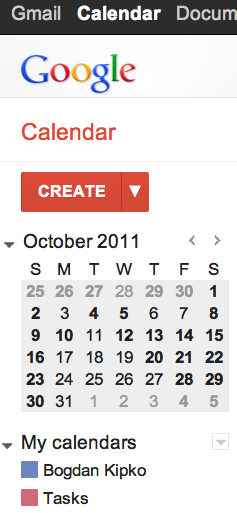I love getting things done. I love productivity. I love lists, itineraries, time tables, action plans, graphs, charts, excel spreadsheets, goals, strategies and mission statements. A while back, I sent one of my friends a detailed pdf document which included my itinerary for when I would be visiting.
In that document, there was a time slot in which we were to have lunch. When he received this document, here is what he said to me: “Bogdan, as long as I have known you, you have always had a time-table and your time has been planned out.” His statement made me think about my approach to productivity in general and getting things done in particular.
With the growing demand for productivity, there can be a disconnect with actuality if there is a lack of clarity. This is why productivity demands clarity. We can be doing a lot but not really getting much done. We can even be so busy doing the work of the Lord that we altogether forget the Lord of the work.
This is why I believe that if we are to strive for productivity, we must possess clarity. Clarity in the area of what we are doing, why we are doing it and how we get it done. Planning and preparing is in fact a biblical concept.
Consider what Solomon said about it:
The plans of the diligent lead surely to abundance, but everyone who is hasty comes only to poverty (Prov. 21:5).
Contemplation about planning was spoken about by an OT prophet:
Consider your ways, Haggai proclaims. (Hag. 1:5).
Jesus even prepared a plan for his disciples to follow before he left:
Luke 9:1-6
Matthew 28:16-20
Some of my friends, family and acquaintances think I am completely ridiculous in being so plan-conscious and goal-oriented. They (lovingly) point me to places in Scripture like Prov. 16:9, Prov. 19:21 and Matt. 6:34. I also never hear the end of it when something I schedule does not go according to plan. There is however a method to my madness. I have learned from experience that if you plan intentionally, at least whatever you are attempting to accomplish will go as close to plan as possible albeit for extenuating circumstances. Yes there will be catastrophes. Yes, things wont go according to plan. Yes, you will experience a life situation that derails your whole plan. Yes, your intricate life plan might be in stark contrast to what God would like for you to do. Yes and amen. But still, if we are to be wise stewards of our time, talent, energy and resources, we are to approach this subject in a prudent and delicate manner.
I have been around people who plan like crazy and people who don’t know what a plan is even if it posted itself to their Facebook wall. I have observed that the former group is much more organized, more fulfilled and makes a bigger impact than the latter group.
I was able to work full-time, volunteer at a church full-time and go to school full-time to finish my master’s degree — all at the same time. I could not have done this without God’s guidance, a supportive spouse and a lot of strategic planning on my part. Here are five ways to boost your level of productivity:
1. Create a to-do list that includes tasks and time-blocks. Write out exactly what you want to accomplish and when you want to accomplish it. Be very specific. When it is on paper or on a screen, it is bound to get done. If you write it on paper, you get the mental satisfaction of crossing out an item with a black sharpie. On the screen, you can you the “strike-through” font feature for a less dramatic effect. If it stays on your mind or in your memory, most likely it will not become a reality. Do not create a task list that is enormous. It is better to focus on a few things at a time and continue to check them off, one by one — than face a looming to-do list and quit before even beginning because of discouragement. Start on the smallest task first. Do that which you can finish the quickest and then move on to the next one. On the to-do list, create time blocks for items. For example:
- 7am-8am – time reserved to pray and read Scripture.
- 10am-12pm – write new content for blog-post.
- 12pm-4pm: do research for sermon.
- 4pm-4:30pm – grab some coffee and respond to notifications.
- 4:30pm – 6:30pm – compose and write sermon introduction; if possible, begin to write out first point.
(Side note — not every single day will look as perfect as above; but, failing to plan consistently is a sure way for your plan to fail constantly)
2. Maintain a virtual calendar that syncs across all of your devices. At the current moment, I have switched entirely to using Google calendar. This calendar syncs across every single one of my devices. It can be accessed anywhere there is access to the web. I get an email sent to me every day at 5am that outlines my agenda for the day. I get notified a day before the event occurs and also an hour before an event begins. Birthdays and anniversary notifications are also emailed to me. I can create an event in a very simple manner. All I have to do is click on the “create” link (from any of my devices) and type in for example “Date Night With Vika Next Friday @ 8pm @ Javier’s in NewPort Beach.” After I type this in, this calendar creates the event for me automatically, filling in each field so I do not have to. I can then view or modify this even in the master viewer. I can also create events that occur daily, weekly, monthly, annually and so on. So for example, I do not have to put in holidays, birthdays or anniversaries every single year. It does it for me automatically and notifies me timely and accordingly. This is why I love google calendar and recommend it to you.
3. Create a list of clearly defined goals at the beginning of the year. Specificity is the key. I write out clearly defined goals in five different areas. I do this at the start of every single year. Currently, here are my five specific areas that I set goals in:
- Spiritual
- Relational
- Professional
- Financial
- Physical
Print this list and put it somewhere you can see everyday. I hung my list in my office behind my computer screen. Every time I sit down, this list is looking right at me. It keeps me on point and accountable. It also helps me track my progress and allows me to reflect more clearly what God has been doing in my life throughout the entire year. Under each goal, I write out specifically what I would like to accomplish. For example, this past year, under my “Professional” goal heading, I listed “Finish my Master’s Degree.” By God’s, grace I was able to accomplish this goal in May of 2011. I wanted to get in the best shape of my entire life. So, under my “Physical” goal heading, I put down “Finish completely P90x in ninety days.” A ninety painful days later, I was able to cross that one off the list as well. You might not be able to accomplish or finish all of your goals that you set out to do. This is ok. For those of you that are OCD, it is not the end of the world.
4. Write (type) a reflection paper at the end of the year. I usually type this out sometime during the last week of the year. In this paper, I highlight strengths and opportunities from each goal heading from point four above. I write about what went well and what needs improvement in each distinct goal area. If I created some unrealistic goals for myself, I will adjust them for next year. I collect these reflections so that every year, I can read them and see how good God has been to my wife and I. It can serve as a phenomenal list for a prayer of gratitude. I also do this so that I can see what I have learned and track my progress from year to year. This helps me see where specifically God has been working on me and through me. I can distinctly point out evidences of His grace in my life. Major life events are recorded here as well. This is an exercise that can take you a few hours to accomplish. But the time investment you make in to it will pay out great dividends as you progress in your life, if the Lord wills for you to continue forward.
5. Embrace the “front-load” principle as much as you possibly can. I remember staying up until 5am when I was in seminary, writing a paper that was due the next day. During the work day, I needed an extra dose of caffeine to function effectively. This is where I learned of this “front-load” principle. Accomplish as much as you can, as far in advance as you can to allow time for revision, reflection and recuperation. For example, if I know I am preaching on a specific topic a month in advance, I begin to get ready a month in advance. I am constantly thinking about the text in order for me to effectively navigate through it as I preach. I am constantly recording ideas for future blog-posts by texting these ideas to myself. Later on, they become reality as I schedule myself to write and create new content. If I know I have guests coming over in two weeks, I will start making necessary preparations at least one to two weeks prior to their arrival. If I know I have multiple meetings to go to after my daily work is done, I will take a change of clothes with me and prepare all of this the night before. This might seem simple or trivial. But, it helps me to “front-load” these items so that I am not frantically trying to prepare for something when I do not have ample time to do so.
These are the five ways in which I hope you can increase your level of productivity. My prayer is that any or all of the above will catapult you into a sphere of productivity that you have not been in before — for the glory of God and for the joy of the people that surround you.
The above might not work for everyone. It does work for me. The key here is not methodology (how you do it) but consistency (actually doing it). Find the system that fits your personality and works in your environment. This will help you gauge the progress you are making. It will allow you to have a more thorough and thoughtful reflection as you progress in life.
Do all this for the glory of God, by the grace of God.
Question: In the comment section, please suggest one tip that you think would benefit the rest of the community! What other tips or best practices would you add to this list? How do you personally maximize your productivity? What specific point are you still struggling with? What point above are you absolutely excelling at and how do you do it?






Leave a Reply